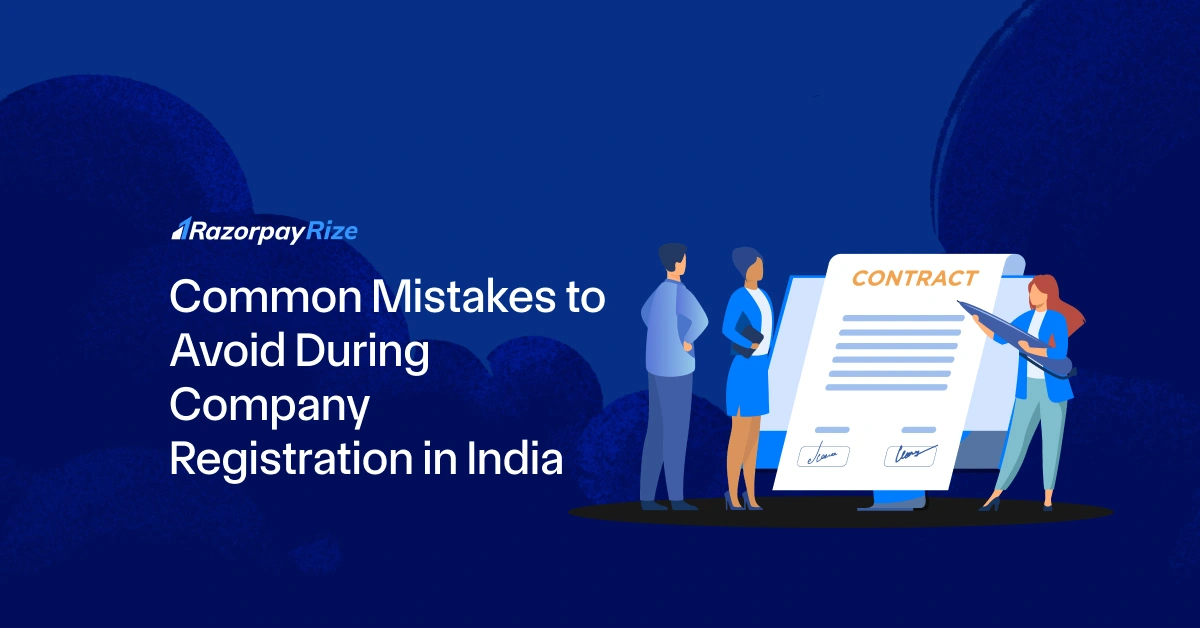India’s start-up ecosystem is booming, with over 100,000 DPIIT-recognised startups and counting. But with opportunity comes risk- several startups get lost in the maze of legal complexities, often during the company registration process.
While registering a company in India has become easier through online portals and streamlined government processes, many first-time founders make errors that create compliance hurdles and legal risks, or even force them to start over.
In this article, we’ll cover the common pitfalls entrepreneurs face when registering a company in India and how to avoid them.
Table of Contents
Choosing an Incorrect or Non-Unique Company Name
One of the most common registration mistakes is picking a company name that is already in use or violates legal naming rules.
Here’s what you need to know:
- Under Section 4 of the Companies Act, 2013, your company name must be distinctive, not identical, or too similar to an existing company or LLP.
- The Trade Marks Act, 1999, prohibits names that infringe on existing trademarks.
- The Names and Emblems Act, 1950, restricts the use of words that imply government patronage, such as “National,” “State,” or “Republic.”
Common errors include:
- Choosing a name without checking trademark availability.
- Using generic or descriptive words that are likely to be rejected.
- Selecting names with restricted or sensitive terms.
Tip: Do a thorough search of the MCA portal and the IP India trademark database before finalising your company name. You can also use our company name search feature to find available company names and domain names in just one click.
Use our Quick Company Name Finder to check name availability and secure your brand identity instantly.
Selecting the Wrong Type or Category of Company
Many entrepreneurs choose the wrong type of company structure without understanding the legal or financial implications.
In India, the major options are:
- Private Limited Company (Pvt Ltd)
- Limited Liability Partnership (LLP)
- One Person Company (OPC)
- Sole Proprietorship
- Partnership
- Public Limited Company
Mistakes often happen when:
- Startups planning to raise funding choose OPC (not allowed to raise VC funds easily).
- Founders opt for Public Ltd without the required scale or compliance readiness.
Tip: Align your company structure with your business model, ownership, and funding goals.
Start your business journey hassle-free. Get expert assistance for Private Limited, LLP, or OPC registration, 100% online, fast, and compliant.
Drafting an Inaccurate or Vague Company Description
A clear and accurate company description during incorporation is important for legal clarity and tax classification. Your description should include:
- Business name and legal structure.
- Primary activities or products/services offered.
- Office location.
- Target market or customers.
- Business objective (aligned with the MoA).
Tip: Spend time drafting a precise company description reflecting your business scope.
Using an Incorrect Office Address or No Rental Agreement
Your company must have a valid registered office address- this is different from your personal address. Common mistakes include:
- Using a personal residence without proper documentation.
- Providing an address with outdated utility bills (proof must be < 2 months old).
- Failing to submit a valid rental agreement or ownership proof.
Tip: Ensure your address documents like electricity bill, water bill, rental agreements, lease agreements, etc. are current and legally valid to avoid application rejection.
Improper or Missing Supporting Documents
Many SPICe+ form rejections happen due to missing or incorrect supporting documents.
You must submit:
- Identity proof and address proof of all directors/shareholders (PAN, Aadhaar, passport).
- Valid office ownership/rental proof.
- Digitally signed e-MoA and e-AoA (Memorandum and Articles of Association).
Tip: Prepare a complete document checklist and cross-verify before submission.
Not Obtaining DIN and DSC Before Starting Registration
A Director Identification Number (DIN) and Digital Signature Certificate (DSC) are mandatory for company registration. Common mistake:
- Entrepreneurs assume these will be generated automatically or post-application.
- In reality, without DIN and DSC, your SPICe+ application cannot proceed.
Tip: Apply for DSC first, then use it to obtain DIN during SPICe+ filing.
Submitting Incorrect Forms or Incomplete Information
Errors in form filling cause delays or outright rejection. Examples of mistakes:
- Incorrect or mismatched personal details.
- Spelling errors in the company name.
- Incomplete director or shareholder details.
- Submitting the wrong form variation.
Tip: Always review forms thoroughly or seek professional help to ensure accuracy.
Unnecessary or Improper Appointment of Directors
Many founders mistakenly appoint all shareholders as directors. Problems with this approach:
- Creates confusion between ownership and management.
- Adds legal and financial liability to shareholders who may not want it.
- Leads to operational gridlock if too many directors are involved.
Tip: Appoint directors based on their skills and involvement, not just shareholding.
Related Reads:
Absence of a Founders’ or Shareholders’ Agreement
Failing to draft a Shareholders’ Agreement is a major mistake in startups. Consequences include:
- Disputes over ownership rights.
- No clarity on voting rights or exit clauses.
- Difficulty in raising investment.
A good Shareholders’ Agreement should include:
- Shareholding structure.
- Roles and responsibilities.
- Decision-making process.
- Exit clauses and transfer restrictions.
Tip: Draft a clear agreement early to protect your startup’s long-term stability.
Not Understanding Local Laws and Regulations
Many founders ignore state-specific compliance post-registration. One key example is Professional Tax Registration:
- Required within 30 days of incorporation.
- Mandatory in many states, like Maharashtra, for both companies and employees.
- Penalties apply for non-compliance.
Tip: Consult a professional to understand local registration and tax requirements in your state.
Neglecting Post-Incorporation Compliance Requirements
Startup founders often assume registration is the final step- it’s not! Commonly missed post-incorporation requirements include:
- Annual return filing (ROC).
- Holding Annual General Meetings (AGM).
- Maintaining proper financial records.
- Complying with tax filings (GST, TDS, etc.).
Tip: Create a compliance calendar to stay on top of these obligations.
Failing to Seek Professional Legal or Financial Advice
Many startups skip professional advice to save costs- this is short-sighted.
Risks of DIY registration:
- Legal non-compliance.
- Incorrect company structure.
- Future penalties or forced shutdown.
Tip: Platforms like Razorpay Rize offer affordable company registration services tailored for Indian startups, making professional help accessible even on a budget.
Frequently Asked Questions
Private Limited Company
(Pvt. Ltd.)
- Service-based businesses
- Businesses looking to issue shares
- Businesses seeking investment through equity-based funding
Limited Liability Partnership
(LLP)
- Professional services
- Firms seeking any capital contribution from Partners
- Firms sharing resources with limited liability
One Person Company
(OPC)
- Freelancers, Small-scale businesses
- Businesses looking for minimal compliance
- Businesses looking for single-ownership
Private Limited Company
(Pvt. Ltd.)
- Service-based businesses
- Businesses looking to issue shares
- Businesses seeking investment through equity-based funding
One Person Company
(OPC)
- Freelancers, Small-scale businesses
- Businesses looking for minimal compliance
- Businesses looking for single-ownership
Private Limited Company
(Pvt. Ltd.)
- Service-based businesses
- Businesses looking to issue shares
- Businesses seeking investment through equity-based funding
Limited Liability Partnership
(LLP)
- Professional services
- Firms seeking any capital contribution from Partners
- Firms sharing resources with limited liability
Frequently Asked Questions
What common mistakes should be avoided during the company registration process?
Some of the most common mistakes to avoid include:
- Choosing an incorrect or non-unique company name that conflicts with trademarks or legal restrictions.
- Selecting the wrong company structure (Pvt Ltd, Public Ltd, OPC) without considering long-term business needs.
- Submitting incomplete or incorrect documents, such as missing rental agreements or using outdated address proofs.
- Skipping the DIN and DSC process, which is mandatory for directors.
- Improper appointment of directors or neglecting to draft a Shareholders’ Agreement.
- Ignoring local compliance requirements, such as Professional Tax Registration.
Neglecting post-incorporation obligations, such as filing annual returns and maintaining financial records.
How can professional assistance help prevent errors during company registration?
Hiring a legal or compliance professional (or using a trusted platform like Razorpay Rize) can help you by:
- Advising on the right company structure for your business goals.
- Conducting thorough name and trademark checks to avoid rejections.
- Preparing accurate and complete documentation to meet government requirements.
- Drafting key agreements (MoA, AoA, LLP Agreement) to protect founders’ rights.
This prevents costly delays, legal risks, and rework that often arise when first-time founders try to register a company without expert support.
What are the potential consequences of making mistakes during company registration?
The consequences of errors during company registration can include:
- The rejection of the registration application requiring you to start over.
- Delays in getting your company operational which can impact funding, hiring, or contracts.
- Legal penalties or fines for non-compliance with registration or post-registration requirements.
- Confusion over ownership or governance, especially if director appointments or shareholder agreements are handled poorly.
- Difficulty opening a company bank account or signing legal agreements, if registration details are incorrect.
In worst-case scenarios, founders may face litigation or forced business closure if serious compliance gaps arise.
















